What Is The Difference Between Residential And Commercial Garage Doors?
Introduction
When it comes to garage doors, many homeowners and business owners often find themselves in a quandary. The initial question that surfaces is: What Is The Difference Between Residential And Commercial Garage Doors? While both types of garage doors serve the fundamental purpose of securing vehicles and providing accessibility, they differ significantly in terms of design, functionality, and durability. In this article, we will delve deep into these differences, exploring the characteristics of residential and commercial garage doors, their functionalities, and even maintenance tips including the importance of commercial garage door repair.
What Is The Difference Between Residential And Commercial Garage Doors?
Understanding the distinction between residential and commercial garage doors can save you time, money, and effort when choosing the right door for your property.

1. Design Differences
Aesthetic Considerations Residential garage doors are designed with aesthetics in mind. They often come in various styles such as traditional raised panels, modern minimalist looks, or rustic carriage-house designs. Homeowners usually prefer doors that complement their home’s exterior.
Commercial Functionality On the other hand, commercial garage doors prioritize functionality over aesthetics. They typically have a utilitarian design that focuses on durability and efficiency rather than style. commercial garage door repair Most commercial doors are made from heavy-duty materials like steel or aluminum to withstand frequent use.

2. Material Composition
Common Materials for Residential Doors Residential garage doors are commonly made from wood, fiberglass, or lightweight steel. Each material has its own benefits; for instance:
- Wood offers natural beauty but requires more maintenance.
- Fiberglass is lightweight and resistant to dents.
- Steel provides security but can be prone to rust without proper treatment.
Materials for Commercial Doors In contrast, commercial garage doors are predominantly constructed using heavy-duty steel or aluminum. These materials offer increased strength and longevity necessary for high-traffic environments.
3. Size Variations
Standard Sizes for Residential Doors Typically, residential garage doors range between 7 to 8 feet tall and 8 to 16 feet wide. This size is perfect for accommodating standard vehicles like cars or SUVs.
Larger Sizes for Commercial Doors Commercial garages require larger openings to accommodate delivery trucks or service vehicles; hence commercial garage doors can range from 9 to 20 feet tall or wider.
4. Opening Mechanisms
Common Opening Types in Residential Garages Most residential garages use sectional overhead doors that open by rolling up on tracks located along the sides of the opening.
Commercial Door Mechanisms Conversely, commercial garage doors may utilize several mechanisms including:
- Rolling service doors
- High-speed fabric or metal roll-up doors These mechanisms allow quicker access and higher cycle rates suitable for businesses needing fast entry/exit.
5. Insulation Properties
Insulation Needs for Homes Residential garage doors often come insulated since many homeowners utilize their garages for hobbies or additional living space.
Commercial Insulation Requirements While insulation is less common in commercial models due to their primarily functional use, some businesses might choose insulated options if temperature control is important (e.g., cold storage facilities).
Characteristics of Residential Garage Doors
1. Aesthetic Appeal
Homeowners often prioritize visual appeal when selecting a residential garage door due to its impact on curb appeal. Styles vary widely from classic wooden designs to sleek modern versions offering numerous customization options including color choices and window placements.
2. Security Features
Residential garage doors typically include features such as automatic locks or smart technology integration that allows homeowners remote access via smartphones—providing peace of mind regarding home security.
3. Maintenance Needs
Maintaining a residential door generally involves regular cleaning and occasional lubrication of moving parts like hinges and rollers—a simple DIY task most homeowners can tackle themselves.
Characteristics of Commercial Garage Doors
1. Durability Focused Design
Commercial models are built tough with robust materials designed to handle heavy usage while minimizing downtime due to wear-and-tear issues—an essential consideration in busy environments where time equals money!
2. Heavy-Duty Hardware Necessities
Given the frequent operation frequency in a commercial setting compared with residential use; these systems utilize reinforced springs along with industrial-grade tracks ensuring smooth operation under strenuous conditions.
3. Increased Maintenance Requirements
While maintenance may seem daunting—and may require professional intervention—commercial systems benefit from routine checks by certified technicians who specialize in aspects such as spring tension calibration which plays an integral role in prolonging life expectancy!

Cost Considerations: Residential vs Commercial Garage Doors
1. Initial Investment Costs
The price range for residential garage doors tends to be more budget-friendly than their commercial counterparts largely due to simpler designs requiring fewer robust materials.
2. Long-term Value Proposition
Although investing upfront costs may seem higher initially when purchasing a new commercial door system—the potential savings gained through reduced maintenance costs coupled with heightened durability make them an attractive long-term investment option!
FAQs About Garage Doors
FAQ 1: What types of materials are best for residential garage doors?
Generally speaking:
- Steel provides strength but should be galvanized against rust.
- Wood gives aesthetic appeal but needs ongoing maintenance.
- Fiberglass resists denting while being energy efficient.
Consider your climate and personal style before deciding!
FAQ 2: How can I maintain my residential garage door?
Regular inspections focusing on cleaning tracks/rooting out debris plus lubricating moving parts will help ensure smooth functioning; consult manufacturer guidelines too!
FAQ 3: How long do commercial garage doors typically last?
With proper installation/regular upkeep—it’s not uncommon for well-built models lasting upwards of 15 years depending upon usage frequency & environmental factors involved!
FAQ 4: What signs indicate I need commercial garage door repair?
Keep an eye out for unusual noises during operation, difficulty opening/closing smoothly & visible damage around frames/hardware which may hint at underlying issues needing attention ASAP!
FAQ 5: Can I install my own residential garage door?
While DIY installation might seem feasible—hiring professionals ensures safety + optimal performance by taking advantage of their expertise/training tuning each component accordingly.
FAQ 6: Do all commercial garages require heavy-duty models?
Not necessarily! It depends on traffic conditions—some businesses opt lighter duty options suited specifically towards less demanding environments (i.e., retail stores) where minimal wear occurs regularly!
Conclusion
In summary, understanding what differentiates residential from commercial garage doors is crucial when making decisions affecting both budgetary constraints & functionality needs within homes versus businesses alike! By taking into account design considerations alongside material choices + potential repair implications down the line—you’ll empower yourself toward making informed selections tailored perfectly toward your unique situation!
So remember: Whether you’re considering installing a new door or repairing an existing one through professional services—always weigh your options carefully based on how they align with your requirements! Happy browsing!